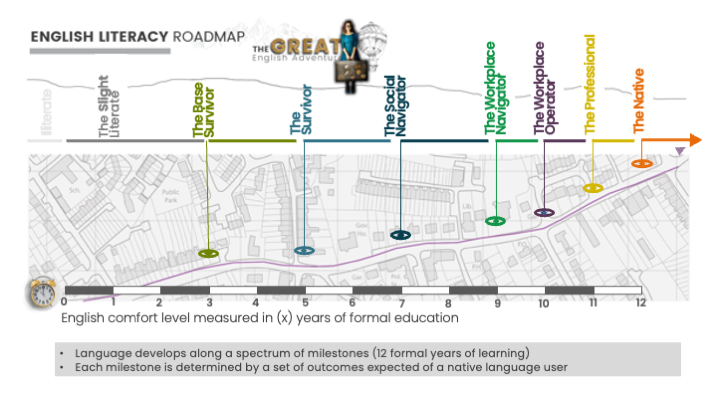In South Africa, we have the challenge of 11 official languages. It is a significant factor in distinguishing English skills levels of the workforce. 90% of society hears a different language from birth to that in which they will learn and work. This impacts early childhood development, critical thinking abilities, access to information in the learning journey and eventually in earning potential. Sadly, the average non-mother tongue speaker not only has difficulty to access employment, but often also sacrifices ideal development of home language. Enough research is available to support the importance of seeking new and more efficient approaches to non-mother tongue user schooling and development strategy overall.
The roadmap illustration below shows the various levels of competency in English and what it entails. In South Africa, the majority of our employable workforce are at a ‘Social Navigator’ competency of the English language when in the SME environment (and any workplace) we need them to be ‘Workplace Operators’.
In an ideal world, they would perform better in a work environment where they can operate in their home language. English is however the language of business – better outcomes depend on raising English literacy skills.
The Social Navigator is comfortable with familiar English phrases that cover essential aspects of life (e.g. very basic personal and family information, shopping, their local area). He/she does simple and routine tasks requiring simple and direct information on familiar matters and in simple English terms. In the workplace, he needs predictable information and can explain routine procedures in English.
The Workplace Operator speaks correct English with ease, with a comfortable range of words to take part in most conversations in English on practical, social, and professional topics. Main ideas of complex text on both concrete and abstract topics are understood and English conversation is comfortable. Writing is clear and in some detail on a wide range of topics and can explain and motivate views and opinion.
Employers prepared to face the realities of their workforce’s true ability to cope in an English environment will take responsible steps to improve such. It will stop valuable training budgets to be misspent, good facilitators to become despondent with unresponsive candidates in learning programmes and poorly skilled employees unable to put knowledge to work.
Poor English literacy and numeracy levels set people up for failure if not recognised!
Be careful to:
- Not select candidates in learning programmes at levels where the gap between delivery of content and capacity to absorb information is simply too big.
- Match recruits in employment to job expectations
- Identify talent and develop appropriately
- Unlock workplace vocabulary, make documents readable for employee and customer/client English literacy skills levels.
- Support access to innovative learning, allowing for a scaffolded approach with sufficient opportunity to apply and build confidence.
Look for quick wins to bridge gaps, avoid a quick-fix mentality.
Ask us about Bite-size English, our online solution to cultivate better access to opportunities. (Combined with our industry-customised conversation board game we entice non-mother tongue users into changing behaviour and using resources to continue developing English skills.) Our ultimate goal is to irradicate constraints in English skills towards economic growth.
At Kaleidoprax, we measure English literacy skills (ELSA, standardised assessment) to provide solutions to empower non-mother tongue speakers to excel in the English workplace.

